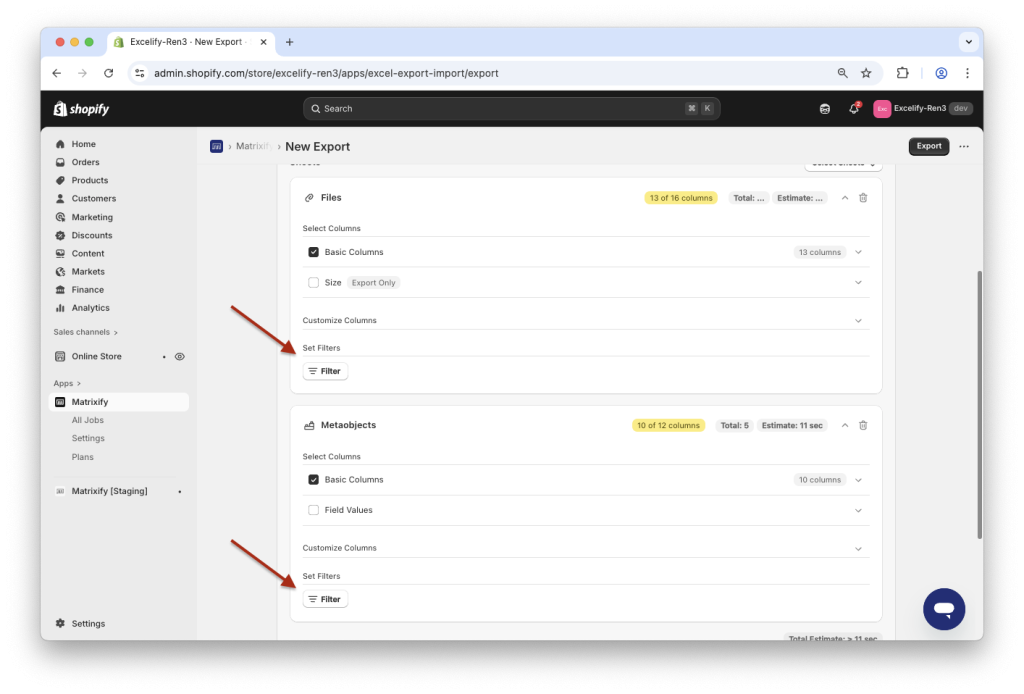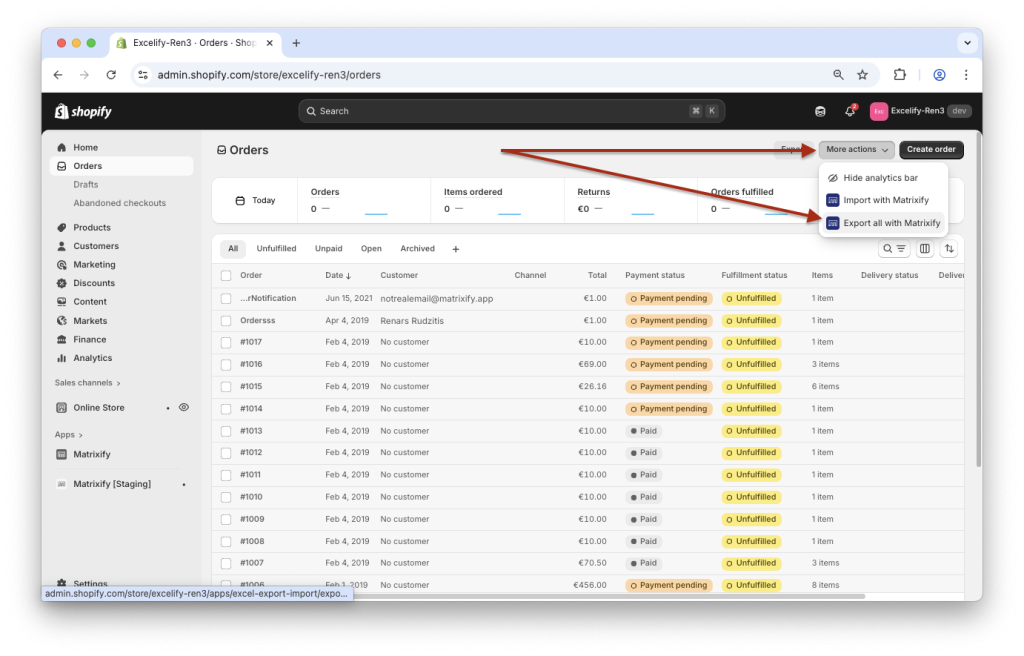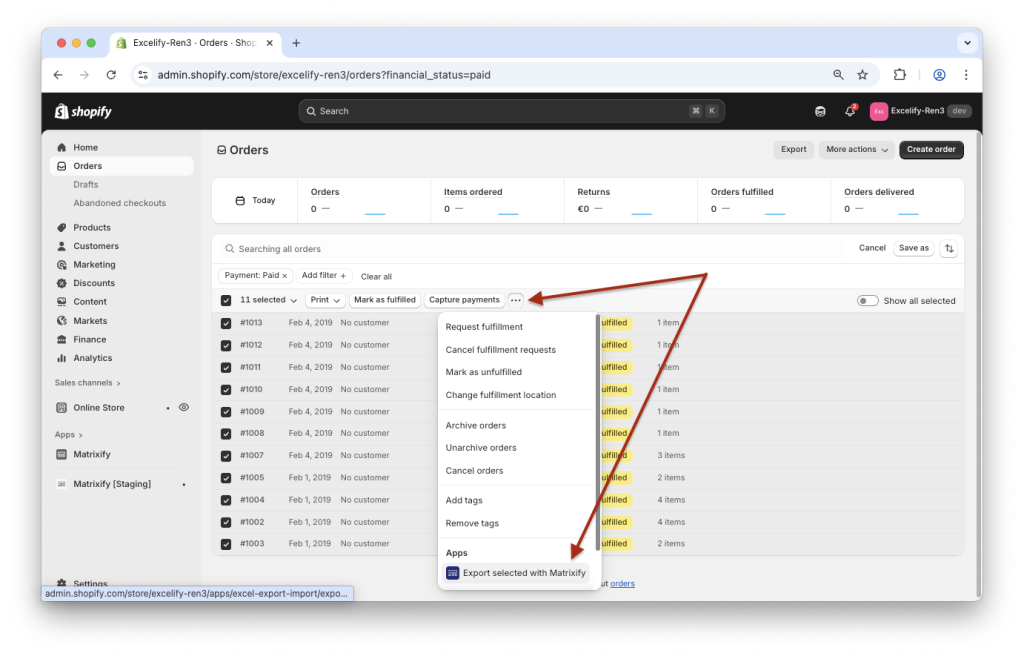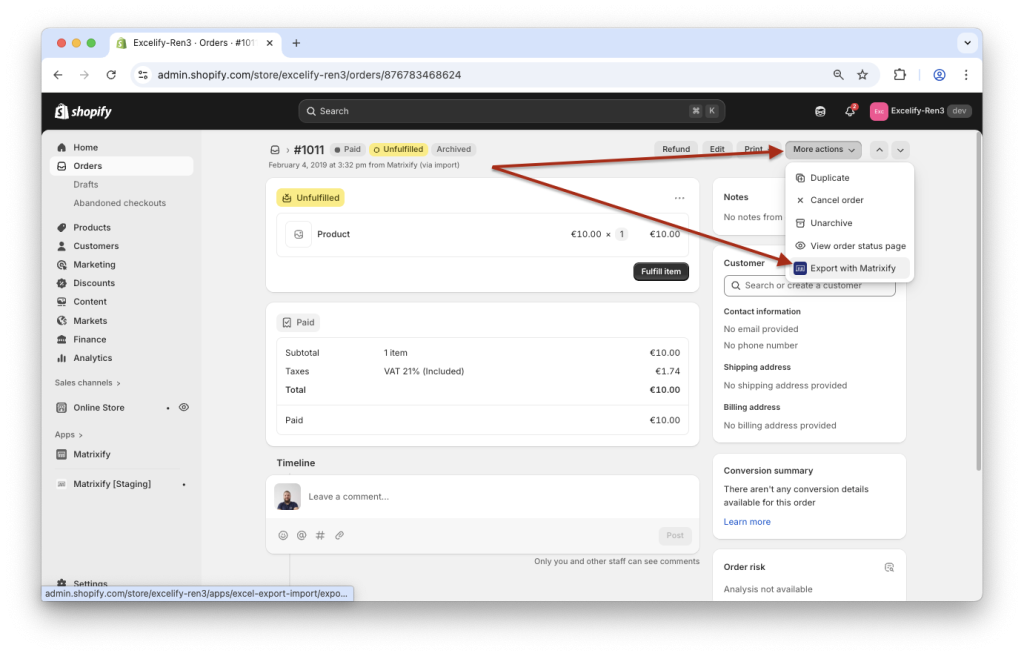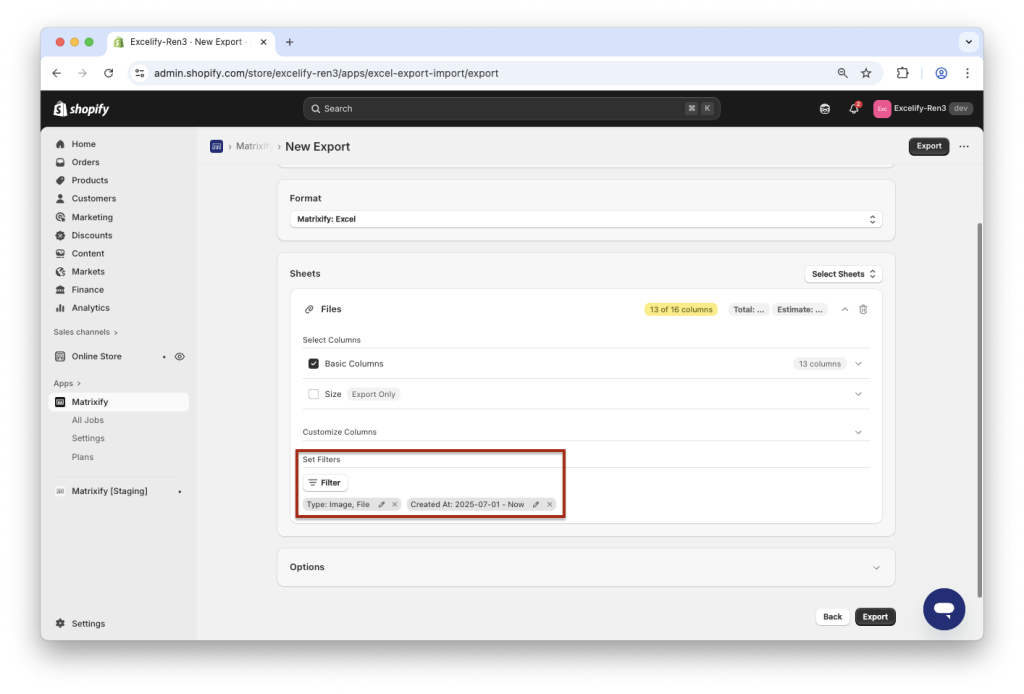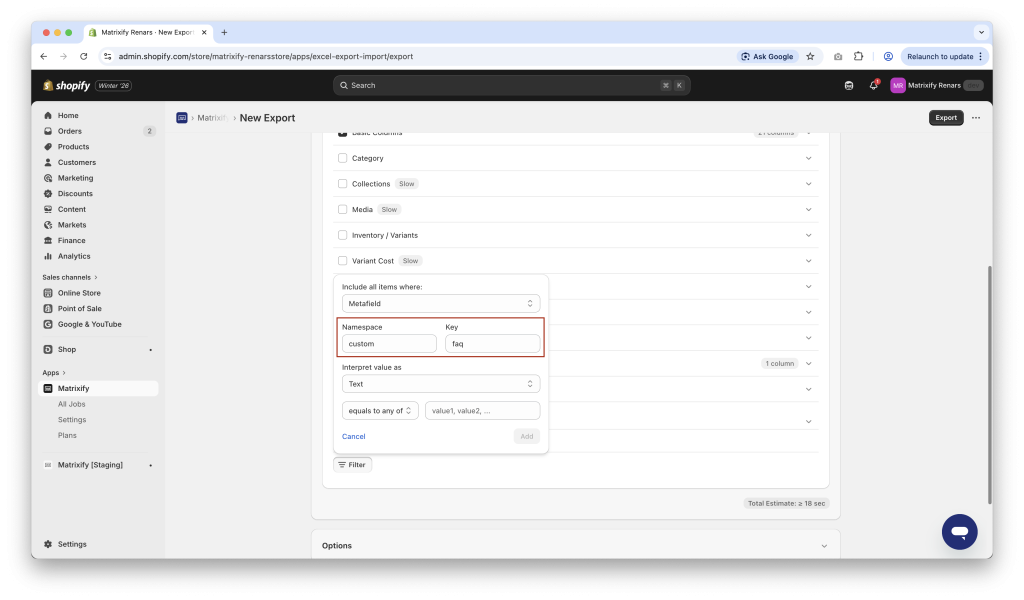Learn to apply Matrixify export filters for customizing your Shopify data exports in the Matrixify app.
This can be incredibly useful when you want to focus on a particular collection, product, or other data sheet, or when you’re looking to speed up the export process by reducing the amount of data being exported.
So, let’s dive in and learn how to make your data exports better tailored to your needs!
Where to find Matrixify export filters?
Once you’ve selected the data sheets you want to export (like Products, Collections, Customers, etc.), you can click on that sheet card to open it and see three sections Select Columns, Customize Columns and Set Filters.
Under the Set Filters section click on the Filter button to open a list of filters for your selected export sheet.
Understanding each export filter
Each possible filter is unique as it filters by different attribute or column values and thus has different conditions that can be set for it.
We have documented each possible filter for each data sheet so that you can find filters that best match your specific use case:
Export selected data directly from Shopify Admin
You can export a specific item directly from Shopify Admin, as well as export multiple items filtered by Shopify’s built-in filters.
Whole data entity from Shopify Admin
Open the relevant Shopify Admin page (for example, Products, Orders, Discounts, etc.), and under “More actions” choose “Export all with Matrixify“.
A New Export page in the app will open with that entity’s sheet pre-selected for export.
Filtered data from Shopify Admin (up to 1 page of results)
In your Shopify Admin, go to the page with the data you want to export (for example, Products, Orders, Customers, etc.), apply filters as needed, and select the items you want to export.
Under the … menu, select “Export selected with Matrixify“.
A New Export page will open in the Matrixify app. The app will automatically select the correct data entity and apply the ID filter for the specific items you selected.
Note – If you choose “Export all with Matrixify” under “More actions”, then Shopify will not pass over the specific selected items, and thus filters will not be applied.
Specific item from Shopify Admin
You can also open a specific item (such as an Order, Product, etc.) in Shopify Admin and export it with Matrixify by using “More actions” → “Export with Matrixify“.
A New Export page will open in the app with the entity selected and an ID filter applied for that single item.
Combining multiple Matrixify export filters
All the filters set for the same entity sheet will be applied with “AND” logical condition. Meaning that all the applied filters will need to match for that item to be included in the export.
For example, if you apply Files sheet filters Type: Image and Created At: Big Bang - 2024-01-25, then only Files that are images and created before 2024-01-25 will be exported.
The “AND” condition is specifically between different filters, not for values within an individual filter.
Each filter can be applied just once, so you cannot add the same filter multiple times. For some individual filters, you might have various selectable conditions, for example equals to any of, which allow you to list multiple values, separated by a comma, where any of the listed values need to match.
Filter Shopify data export by Metafield values
With the Matrixify app, you can also filter your data Exports by Metafield values by selecting to apply Metafield filter.
Fill Metafield details in the filter
When applying the filter, you will need to know the specific Metafields namespace and key.
To find the correct namespace and key, you can check the metafield definition in the store:
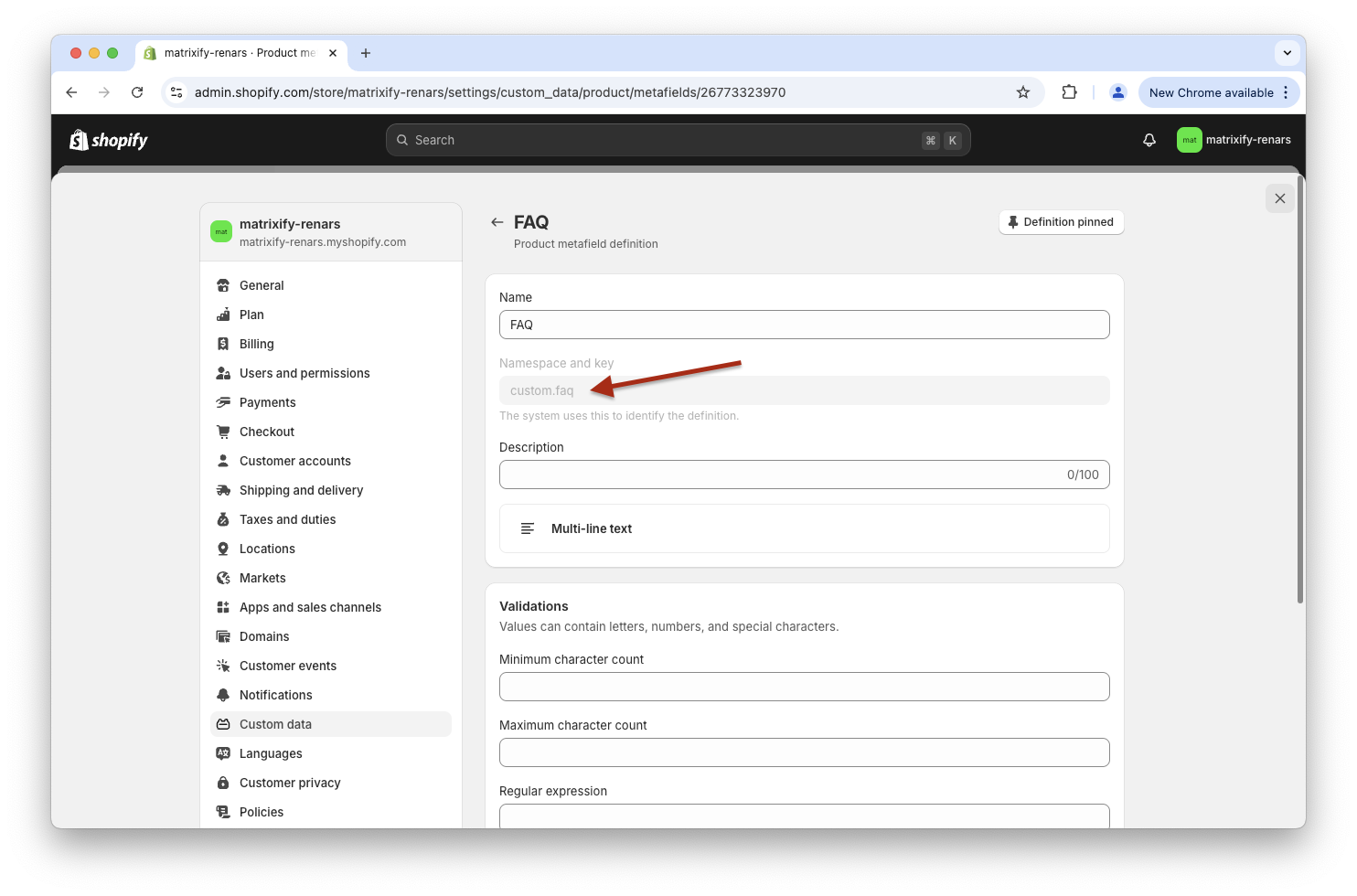
For example, if the namespace and key value in Shopify is custom.faq then you would enter custom as namespace and faq as key.
You can select to interpret the value as a Text or as a Number.
For most metafields, you would use the Text option unless it is specifically a number Metafield such as “Number integer” or “Number decimal”.
The value interpretation is needed to be able to apply different conditions based on the Metafields values – for example, you might need to filter by value “greater than” if it is a number, but such a condition would not work if the Metafields value is text.
Filter by Reference Metafields
Reference Metafields, internally in Shopify, are stored as internal Shopify GID values, but in the Matrixify Export Metafield filter, you can also apply a user-friendly value in the filter.
For example, if the Metafield you are filtering by is a Product Reference Metafield then you can filter by the Producs GID, ID or Handle values. Or if its File Reference Metafield, then Files GID, ID, or name with extension.
Troubleshooting common issues with Matrixify export filters
Total item count and estimated export duration change
When you apply a filter in the Matrixify app, the item count and estimates will not change as the app does not know how many items match the applied filters.
For some filters, Matrixify still has to run through all your store data to find those items. So, don’t worry if the count and estimate don’t change right after applying the filter. Once you start the export, the app will begin processing the store data with filters applied.
The Total item count will remain the same for the whole job duration as it represents the total count of items for this entity in the store, but the Exported item count will represent exported items and thus show the filter working.
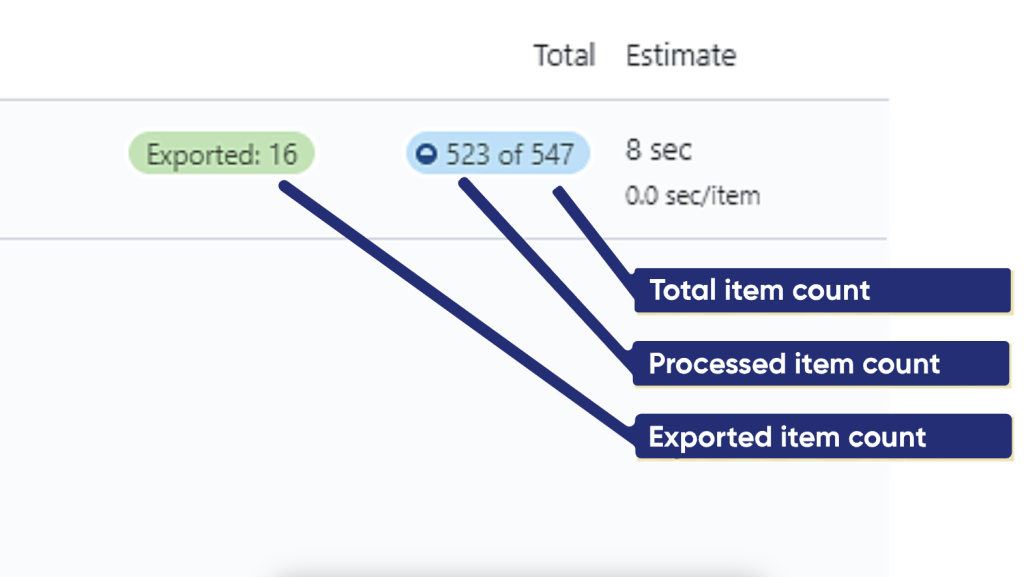
Filter did not make the export faster
Applying a filter does not necessarily speed up the export process. The Matrixify app still has to run through all your store data to find the items that match the filter criteria.
For some filters, the Matrixify app can filter by querying the Shopify API directly so they might show a sudden jump in the processed item count when the export job is running.
Date filter with the “relative date” condition did not include recent items
Condition relative date is available for all the date filters and it is unique – it allows applying filters dynamically which is useful for repeated exports but it might come with some confusion on how it is working.
The “relative date” condition filters the last full date period.
For example, if your export has a filter Created At – relative date – Last: 1 days and it starts at 10 am, it will export everything for the full calendar “yesterday” – from >= 00:00 till < 00:00 (to be very precise with date boundaries).
All the time filters are applied in your store time zone.
The same example if using filter Last: x hours, for example, Last: 3 hours. If export starts at 15:43, the app will apply the filter last 3 full hours – from >= 12:00:00 until < 15:00:00 (less than 15:00:00).
What to do next?
- Install and try out the Matrixify app in your Shopify store.
- Create an export, and see what filters might be best for your specific use case.
- If there is a filter missing that would be useful for you, please reach out to Matrixify Support and let us know about it. It helps us to better organize future developments for the Matrixify app.


